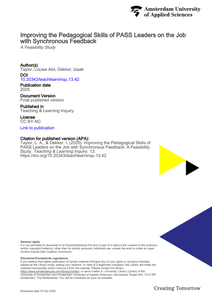The impact of organized youth sport on youth development depends on various conditions in the pedagogical climate, such as how sport is delivered by youth sport coaches. While this is broadly acknowledged and provides a basis to improve youth sport and its developmental outcomes, little is known about the pedagogical perspectives of youth coaches on their practice. This study uses semi-structured interviews with 32 youth sport coaches in diverse youth sport contexts in the Netherlands. Reflexive data analysis is employed to garner insights into coaches’ role perceptions, coaching goals, and underlying values. The findings show that while youth coaches focus on sport-centered activities, many foreground non-sport dimensions such as life mentoring and working towards social inclusion as critical elements of their work, reflected in five pedagogically-oriented goals: discipline, autonomy, resilience, social abilities, and aspirations. Underlying these goals are pedagogical values such as building and maintaining caring relationships with participants. These goals and values echo scientific literature on pedagogical sport climate conditions (e.g. positive youth development), and challenge notions of youth sport as a performance-oriented and uncaring setting. The results contribute to existing knowledge about youth coaches’ pedagogical orientations, and inform the development of strategies to stimulate positive sport practices and developmental outcomes for participants.
DOCUMENT

Peer assisted study sessions (PASS), also known as Supplemental instruction, are structured peer guided sessions linked to a specific course, led by experienced and trained students called PASS-leaders. These PASS-leaders undergo several days of training before running their first session and receive supervision and feedback ‘on the job’. Research suggests that training improves student outcomes whereby supervision is considered best practice, as required by PASS protocols. However, it is unclear what type of supervision best supports PASS-leaders. Thus far, studies have not compared different methods for on-the-job interventions. Current practice involves supervisors observing PASS sessions without intervening but providing post hoc feedback. While this prevents undermining the PASS leaders, it delays their ability to act on feedback immediately. This study, carried out at an institution for initial teacher education, developed and tested a method for providing immediate feedback using a bug-in-ear device linked to a live-stream. Six PASS-leaders were observed during 4-6 sessions each, receiving either synchronous feedback with a bug-in-ear or in-person asynchronous post hoc feedback. In group interviews PASS-leaders reported appreciating the immediacy of synchronous feedback which allowed them to act on it in real-time. The surveys after each lesson indicated that they felt significantly more confident about teaching following live feedback. They described the supervisor as an invisible helper, providing support or assistance. Because the bug-in-ear method could only provide feedback on visible instructional and pedagogical actions, both PASS-leaders and PASS-supervisors recommended using this as a supplement to a pre-session briefing and a post-session debrief.
DOCUMENT

Online supplements to Smit, E., Tuithof, H., Savelsbergh, E., & Béneker, T. (2023). Geography teachers’ pedagogical content knowledge: A systematic review. Journal of Geography. https://doi.org/10.1080/00221341.2023.2173796 Supplement 1: Extended information on selected studies Supplement 2: Full references of studies used in the review Supplement 3: Codebook Abstract: Pedagogical Content Knowledge (PCK) is the knowledge teachers use to teach a specific subject to a specific audience. The importance of PCK to quality teaching is widely recognized. However, an overview of research about geography teachers’ PCK is missing. To fill this gap, we conducted a systematic review. We analyzed 43 empirical studies, but only 9 used PCK as a framework. Most studies addressed instructional strategies or teaching orientations. The studies were too diverse to draw conclusions on geography teachers’ PCK in general. But portraits of 16 geography teachers emphasized the necessity of geographical knowledge and teaching experience for PCK-quality.
MULTIFILE

Within the framework of the “Greening Games” project, we will develop, test and distribute flagship didactic materials addressing the interdisciplinary nature of green digital gaming. These will be tested in selected higher education programs and finally shared as open access content for the broader academic and teaching community. It is our core strategic responsibility to educate students about the relations between digital games and environment. We believe that the more aware students of today will become greener game designers, programmers, and academic leaders of tomorrow. At the centre of our partnership’s didactic philosophy are human responsibility, ethical game design and sustainable gaming culture. Societal IssueVideo games serve as technological marvels and cultural reflections. McKenzie Wark suggests they are integral to a shared culture, fostering critical thinking. Games act as arenas for cultural values and environmental awareness. Climate-aware video games, often referred to as 'green games' or 'eco-games,' raise ecological consciousness and reconnect players with nature. For example, Riders Republic, which replicates real-world terrain using satellite imagery, inspires eco-awareness. However, the environmental footprint of video games, reliant on digital electronics and resource-intensive consoles, poses challenges. Developers, manufacturers, and gaming giants must address these impacts. Benjamin Abraham emphasizes sustainable game development as a holistic solution beyond incorporating green content.Benefit to societyBy developing teaching materials on green gaming for higher education, we create the following impact. We will…- increase the awareness of this subject among Bachelor’s and Master’s students.- enhance students’ knowledge of green gaming and their ability to integrate existing solutions into their game projects.- stimulate more research interest among research staff as well as students.- facilitate the uptake of pedagogical resources on green gaming by lecturers and professors.- create a European research community around the topic.- raise the visibility of green game studies among the game industry and wider public.
Lectoraat, onderdeel van NHL Stenden Hogeschool